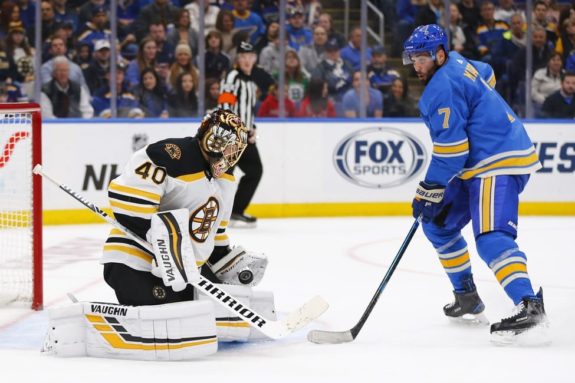In most championship campaigns, a team will benefit from a red-hot goaltender. Even the strongest of teams, from the blue line up, will lean on a goalie who is locked in at the right time in order to survive the grueling regular and postseason marathon that leads to the Stanley Cup. At the very least, teams with championship aspirations need consistent goaltending. For the Boston Bruins, consistency in net hasn’t been a staple this season.
That isn’t to say the Bruins have suffered from poor goaltending. Both Tuukka Rask and Jaroslav Halak have carried the team for portions of the season. For the most part, one of the two has picked up the slack left by the other, and Boston’s position in the standings reflects that.
That said, both goaltenders have struggled with consistency at some point this season – and that’ll have to change if Boston has hopes of achieving something greater in the coming months.
Two Tendies, Too Streaky
In the early days of this season, one wouldn’t be blamed for mistaking Halak as the Bruins’ No. 1 netminder. He was stellar to begin his stint with the Bruins, earning Boston points in each of his first six starts, including four victories. Over that span, he recorded two shutouts and allowed two or fewer goals in six of seven games.
His monthly splits in October (.947 save percentage, 1.51 goals against average) and November (.928 save percentage, 2.53 GAA) gave some credence to the debate that Halak, and not Rask, should be making more starts.
To further the debate, Rask’s early season stats left something to be desired. He was chased by the defending champion Washington Capitals on opening night, giving up five goals on 19 shots. He followed that game up with a poor month of October, winning three of six starts with a lackluster .902 save percentage and 3.15 GAA.

Rask picked it up in November but struggled (though not as badly) in December. Then, Rask caught fire for his annual mid-season hot streak, and he’s been locked in since. He finished the month of January with a 5-0-2 record, giving up two or fewer goals in five of seven starts. His .938 save percentage and 1.91 GAA for the month reflected the turnaround he made in the new year.
Currently, he’s won six of his last seven starts and made a series of game-saving stops before being beaten in the shootout in his only loss over that span (Feb. 23 against the St. Louis Blues). Halak, however, trended in the opposite direction in the late months of 2018. His monthly save percentage dropped by at least 18 points per month from October to December, en route to a .863 save percentage and 3.40 GAA in the final month of 2018.
Since the All-Star break, Halak has found his game once again. In four starts, he has earned a .957 save percentage and 1.42 GAA, with a shutout for some added flair.
Bruins Need Consistency from Both Goaltenders
As we make our way into the final stretch of the season, the Bruins will need consistent goaltending from both of their netminders in order to be successful.
While Boston’s offense has been doing well lately, even without star winger David Pastrnak, there will be nights in the future when it just isn’t there, and the B’s will need whoever is in net to steal some results. As it stands now, it looks like the Bruins will be battling it out with the Toronto Maple Leafs for home ice advantage in the postseason. Earning that will require consistency from both goaltenders.

Make no mistake, barring a dramatic collapse in performance, Rask will be Boston’s go-to netminder in the postseason. That, however, does not mean that Halak won’t serve a very important role down the stretch.
The 33-year-old will need to continue riding his post-break streak through the regular season in order to rest Rask for the postseason. grind In years past, Rask has (admittedly) been leaned on too much in the final trials of the regular season, causing him to be fatigued in the playoffs. In the 2016-17 season, Rask appeared in 65 of 82 regular season games, causing Don Sweeney to admit that Rask was overworked after the season’s end.
Last season, Halak’s numbers fell in the final months of the regular season. To be blunt, that can’t happen this season, or Boston will be in trouble. The Bruins need to know that they can trust Halak with a respectable workload in the final weeks so that they can avoid letting history repeat itself with regard to Rask’s playoff preparation.